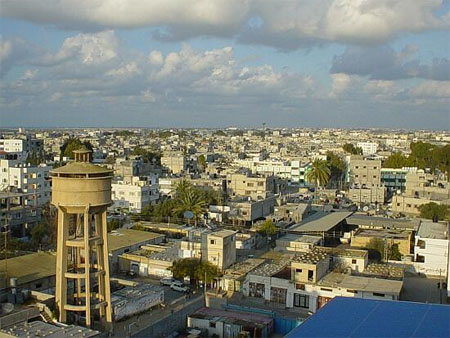
A camp in Gaza. Photo: Mohammed from Rafah
|
 A camp in Gaza. Photo: Mohammed from Rafah |
| Umm Jammal Bakiyya, Rafah camp, April 8:
|
|
Umm Jammal is a close neighbour of the Shahadas but it's not through them that I know her, it's through her daughter Zakkiya, whom I met in an UNRWA office in Gaza City. It was Zakkiya who told me the outlines of her mother's story, and who made me decide to visit her while in Rafah. This was a family that had been displaced many times, and whose self-built home in Tell al-Sultan had often been threatened with demolition. Umm Jammal is a widow and the mother of a martyr. I expect a story of suffering, courage and persistence from this family. They come originally from the village of A'qir.
It was the second day of the Feast when I visited Umm Jammal. Umm al-Abed insisted on accompanying me there, though the arthritic pain that most camp dwellers develop through living in poor habitat means that walking is painful for her. Yet she is persistently active. We go early because we know that this home will fill with relatives and friends coming to salute the mother and family of a 'martyr'. A'eed visits are one way the community honours those whose children have been killed or imprisoned for life in the national struggle. In between greeting visitors, Umm Jammal tells me her story. They were doubly refugees: first in 1948 from A'qir (near Majdal in Southern Palestine) to Gaza, moving between different camps - Deir al-Balagh, Nuseirat, Rafah; then again in the war of 1967 from Gaza to al-Arish in Sinai. From there they had tried to |
reappropriate a shelter that had belonged to Abu Jammal's mother in Rafah camp, but it had been destroyed. So with their own hands they built their present home in Tell al-Sultan. Made out of zinco, they called it the 'Hut of Hope'. The Israelis tried to bulldoze it but Zakkiya stood in the way of the bulldozer. A court gave them three days to remove the structure. Instead they moved into it even though it wasn't finished, even though it was winter. If you are a Palestinian refugee, this is what you do to have a roof over your head.
'Imad had been taken by the Israelis from this house. He gave himself up so as to avoid the home's destruction. At one time, Zakkiyya tells me, five of her brothers were in prison. Abu Jammal had also been in prison. Umm Jammal must have spent much of her life in prison visits, which mean circuitous journeys and long waits. Once Umm Jammal walked from Jabaliya to the Ahli Hospital under night curfew to see her sons. Her deeply wrinkled face bespeaks a life far harsher than that of any peasant woman in Palestine, however poor.
Umm Jammal begins her story: |
[Umm al-Abed Shahada] [Umm Muhammad Shahada] Copyright©2005 |
|